

SUBSCRIBE TO OUR FREE NEWSLETTER
Daily news & progressive opinion—funded by the people, not the corporations—delivered straight to your inbox.
5
#000000
#FFFFFF
To donate by check, phone, or other method, see our More Ways to Give page.


Daily news & progressive opinion—funded by the people, not the corporations—delivered straight to your inbox.
A year after the painstaking public execution of George Floyd, America is caught between hope and despair at what comes next. The much-touted racial reckoning of a country finally ready to acknowledge "the blood at the root" of its origin story has run into recalcitrant racist reality, from a nationwide move to ban teaching about race to "the neverending tragedy" of Floyd - a human being who deserved to live - and the 1,000 George Floyds who have died since.
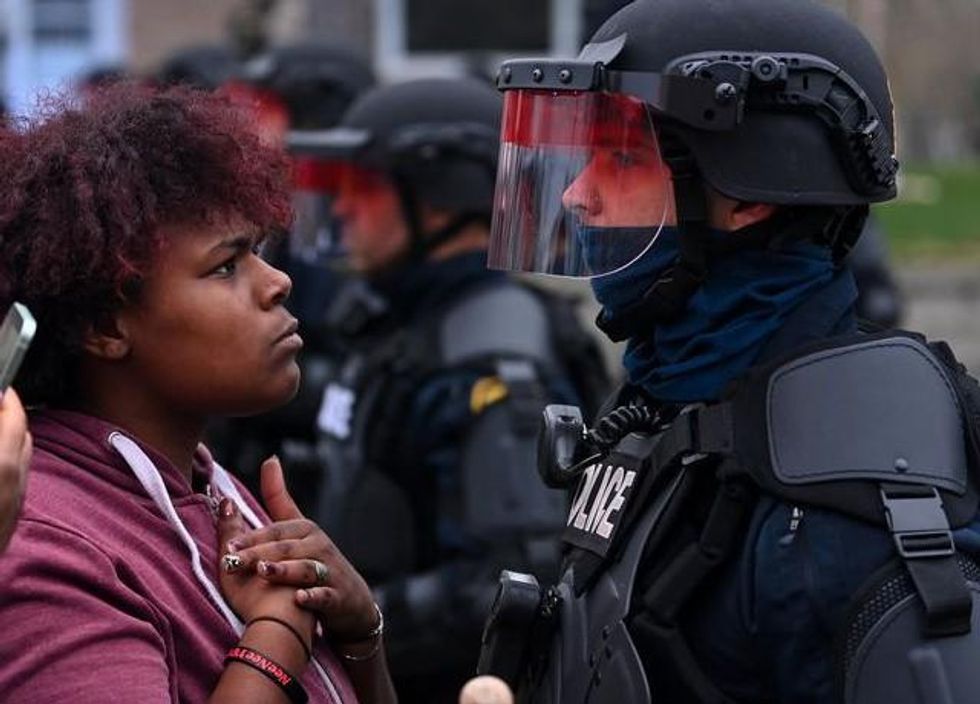
Facing off against America's systemic racism. Photo by Joshua Lott
A year after the painstakingly prolonged public execution of George Floyd, America is caught between hope and despair at what comes next, with the much-touted racial reckoning of a country possibly finally ready to acknowledge "the blood at the root" of a vexing origin story slamming into recalcitrant racist reality on all sides. Many Confederate statues have come down, and more Americans have been speaking, reading, thinking about racism. Still, says Donald Williams, who witnessed Floyd's murder and "called the police on the police" - his anguished charge, "Y'all are murderers, bro" played at Chauvin's trial - the trauma remains. "I don't think most of America understands," he says. "They kind of see it and hear it, but I don't think they fully understand." Little wonder, given our bloody history and a current, panicked, right-wing move to rewrite it. Starting with the original perfidious police account of Floyd's murder, a version of reality that unfolds daily - a man died after a "medical incident during police interaction" after he "resisted officers" - Julia Carrie Wong explores "the laborious project of establishing truth in the face of official lies" that marked much of last year's racial awakening, and a reactionary rebuttal "bent on reasserting a whitewashed American myth" that leaves no room for racism. Today, at least 15 states have passed or proposed legislation to limit or outright veto talk about race in schools, often by banning "critical race theory," which examines the role of racism in America's laws, and other "divisive concepts." Bills range from South Dakota's vague "act to (prohibit) curricular materials that promote racial divisiveness" to Arkansas' HB1231 specifically targeting "the Use of Public School Funds to Teach the 1619 Project," last year's landmark New York Times study of America's deep roots in slavery, whose creator Nikole Hannah-Jones was just denied tenure at UNC-Chapel Hill by a GOP-linked board of trustees. The rare move to block "this essential historical inquiry" has been blasted by those who view academia as "one of the few domains (where) people do not have to risk their jobs to speak truth to power."
As is often the case, the deliberately polarized, "chronically bad-faith" fight against fact and history in the name of defending founding fathers who deemed black people three-fifths human is cultural as well as legislative. Critical race theory, Wong argues, "has morphed into an existentialist threat" for the cancel-the-libs likes of the right-wing Heritage Foundation, which recently hosted a panel discussion about the threat of "the new intolerance" and its "grip on America." "Critical race theory is the complete rejection of the best ideas of the American founding," intoned its moderator, who called it "some dangerous, dangerous philosophical poisoning in the bloodstream"; she added that believers' "rigid persistence" has made the theory "a constant daily presence in the lives of hundreds of millions of people," which Wong notes has "probably come as a surprise to hundreds of millions of people." Multiple groups like the Educational Liberty Alliance have sprung up peddling the same frenzied, fear-mongering rhetoric. The Foundation Against Intolerance & Racism (say what?) blasts the "indoctrination" of "malleable young minds" and "the hijacking of our schools"; What Are They Learning seeks to be a "woke-e-leaks" for parents to report mentions of racism in school No Left Turn in Education shrieks, "Radical teachings have infiltrated schools across the nation," with talk of diversity and inclusion hiding "an aggressive totalitarian ideology" that seeks to "overturn our society by sowing divisiveness and hate" among "shunned and traumatized" children. And evil Mitch is there for them: He killed a paltry federal grant to support U.S. history and civics education, decrying "this divisive nonsense...Americans never decided our children should be taught our country is inherently evil." "Whose children are we talking about?" retorts a history professor of color, echoing the widow of Lin-Manuel Miranda's Hamilton asking, "Who Lives, Who Dies, Who Tells Your Story? "Just say that you don't want white kids to learn about racism," she says. "History is about power."
The virgin-birth version of America's founding has been eagerly, successfully parroted by right-wing media, whose viewers eat it up. In a recent focus group, the Times reports - though OMFG why?! - 14 Trumpists were asked to "speak candidly" about race in the wake of George Floyd's murder, or "death." Floyd, they said, was "a tragedy" and "an addict." Somehow, 13 of the 14 thought he was responsible for his own demise; before it, they all believed police treated everyone the same, now only one doesn't; they all say racial discrimination "is not a big problem" in the U.S.; BLM is "a Marxist hate group" of "losers"; "agitators" are "stirring up trouble"; without them "we would have far less problems." Fewer, actually. And still people die. In the year since Floyd's murder, police have killed another 1,000 people; three times more often, they're black in a country that still "has an insatiable desire for our death and our suffering," and "our bodies remember." George Floyd - not just a victim or hashtag or symbol but a brother, father, son, "flesh and blood human being" who deserved to live - is still dead in "a neverending tragedy," because "things are not going to change." George Floyd, writes a bitter, fact-based Lawrence Ross, "is a feature not a flaw in the system. Built into the design. And every discussion about how the memory of George Floyd's murder is going to change something is a lie...There will be more George Floyds. There are more George Floyds." Which is why Marlon James, the Jamaican-born author of four novels - including the searing, prize-winning, Bob-Marley-themed A Brief History of Seven Killings - still leaves a party when a maximum of six white people get drunk, and observes a self-imposed curfew on riding his bike at night, and goes out of his way to avoid police. After 12 years of living in Minnesota, where he teaches literature at Macalester, as "a big Black guy," he's described his "gradual though futile reduction of myself" in a country where "even a thin Black man complying with the law can still be seen as a justifiable threat." "No matter how skinny I made myself," he first wrote after the murder of Philando Castile, "still, in society's mirror, I was still not small enough."
On avoiding police "because I don't know how to physically act around them": Do I hold my hands in the air and get shot, do I kneel and get shot? Do I reach for my ID and get shot? Do I say I'm an English teacher and get shot? Do I tell them everything I am about to do, and get shot? Do I assume that seven of them will still feel threatened by one of me, and get shot? Do I simply stand and be a big Black guy and get shot? Do I fold my arms and squeeze myself smaller and get shot? Do I be a smartass and get shot? Do I burst out crying and get shot? Do I shake too hard from being nervous and get shot? Do I try to control my nerves and get shot? Because white people still look at fear of Black skin as one of their rights, and God help you if that skin moves."
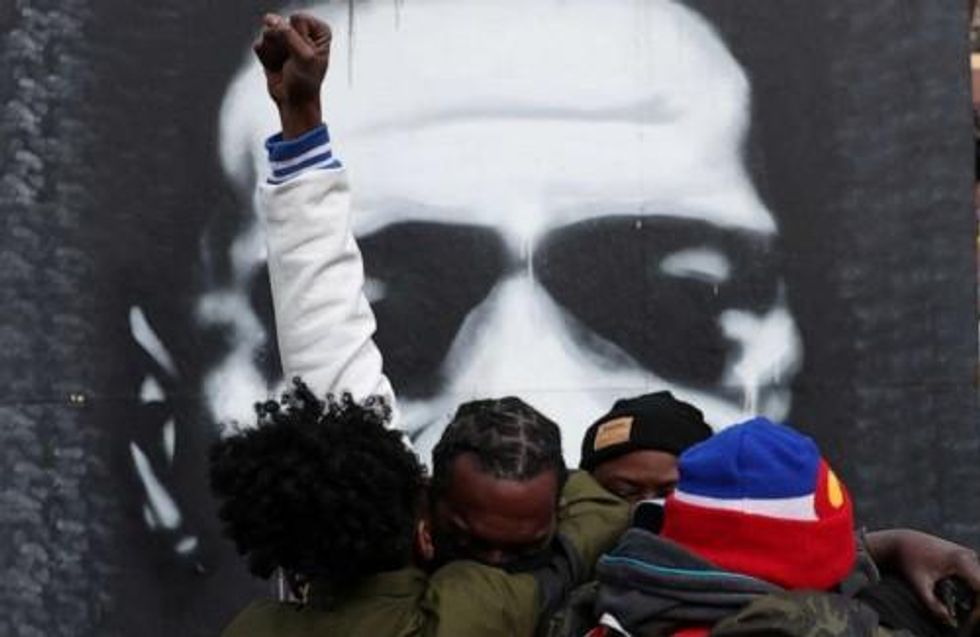
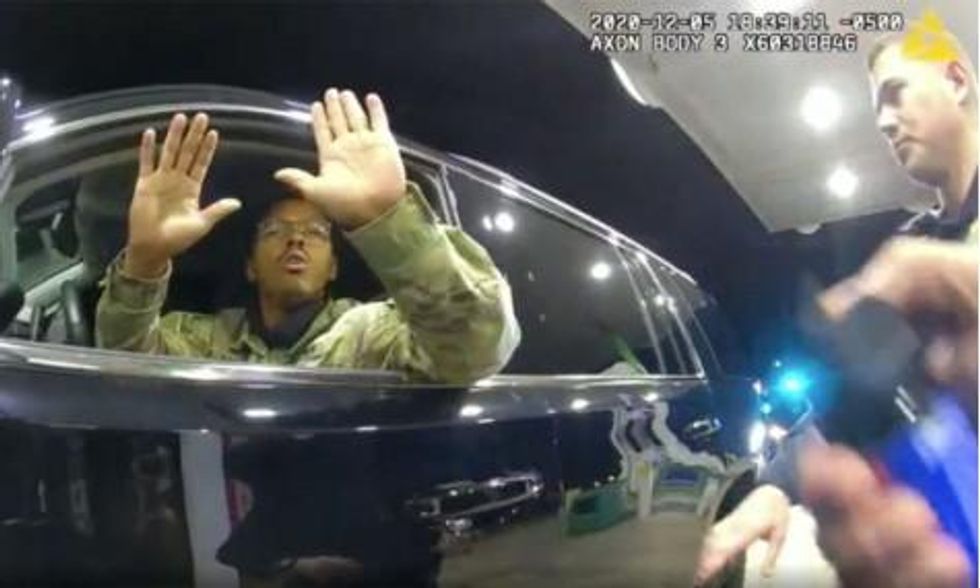
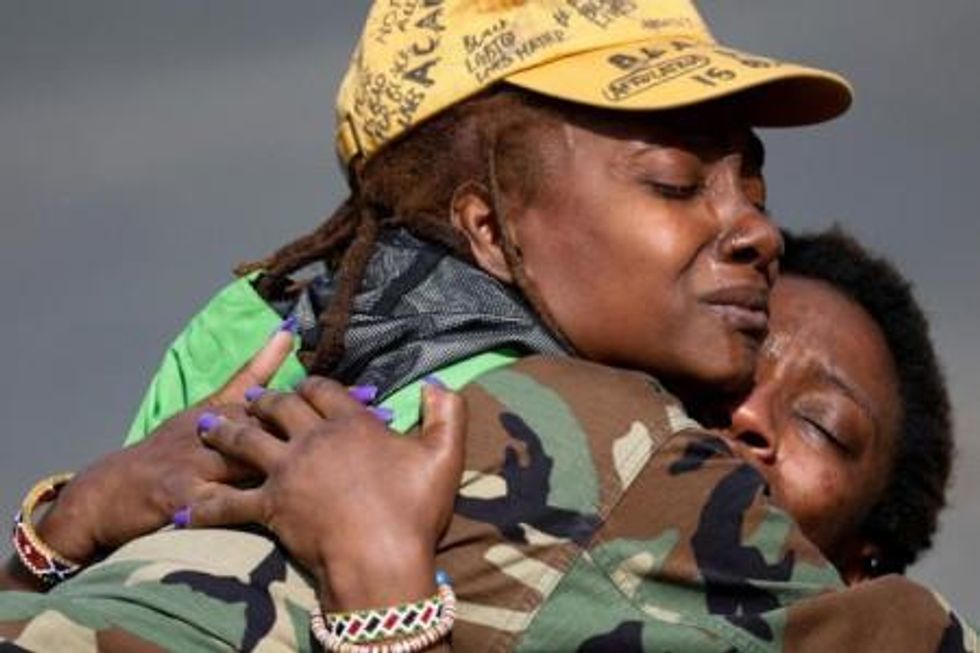
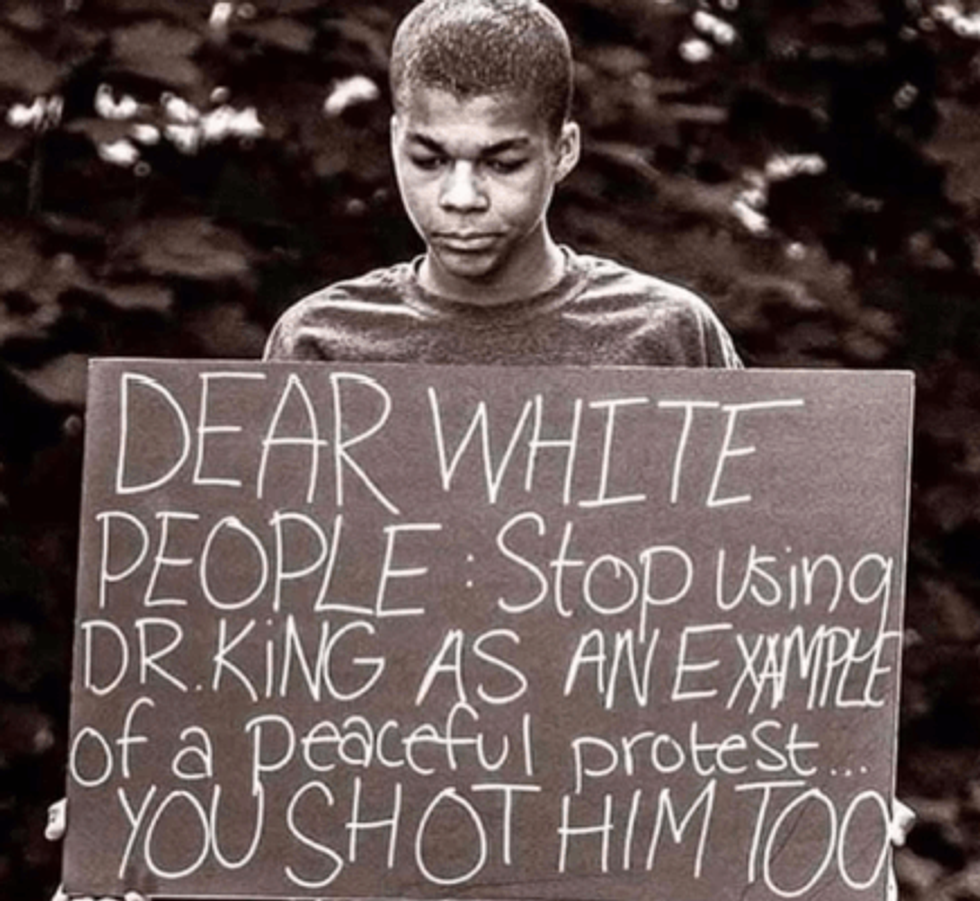
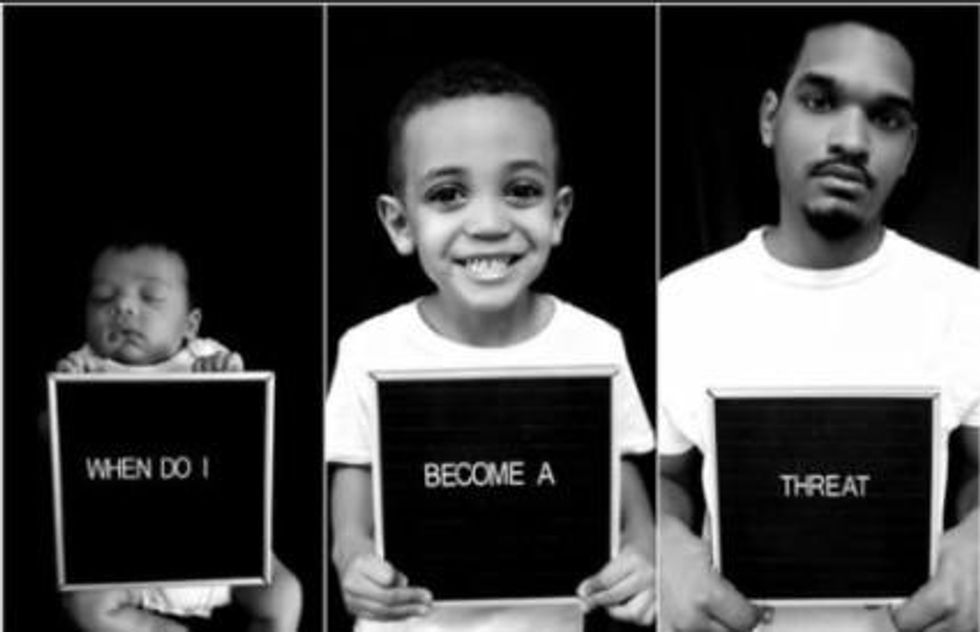
Dear Common Dreams reader, The U.S. is on a fast track to authoritarianism like nothing I've ever seen. Meanwhile, corporate news outlets are utterly capitulating to Trump, twisting their coverage to avoid drawing his ire while lining up to stuff cash in his pockets. That's why I believe that Common Dreams is doing the best and most consequential reporting that we've ever done. Our small but mighty team is a progressive reporting powerhouse, covering the news every day that the corporate media never will. Our mission has always been simple: To inform. To inspire. And to ignite change for the common good. Now here's the key piece that I want all our readers to understand: None of this would be possible without your financial support. That's not just some fundraising cliche. It's the absolute and literal truth. We don't accept corporate advertising and never will. We don't have a paywall because we don't think people should be blocked from critical news based on their ability to pay. Everything we do is funded by the donations of readers like you. Will you donate now to help power the nonprofit, independent reporting of Common Dreams? Thank you for being a vital member of our community. Together, we can keep independent journalism alive when it’s needed most. - Craig Brown, Co-founder |

Facing off against America's systemic racism. Photo by Joshua Lott
A year after the painstakingly prolonged public execution of George Floyd, America is caught between hope and despair at what comes next, with the much-touted racial reckoning of a country possibly finally ready to acknowledge "the blood at the root" of a vexing origin story slamming into recalcitrant racist reality on all sides. Many Confederate statues have come down, and more Americans have been speaking, reading, thinking about racism. Still, says Donald Williams, who witnessed Floyd's murder and "called the police on the police" - his anguished charge, "Y'all are murderers, bro" played at Chauvin's trial - the trauma remains. "I don't think most of America understands," he says. "They kind of see it and hear it, but I don't think they fully understand." Little wonder, given our bloody history and a current, panicked, right-wing move to rewrite it. Starting with the original perfidious police account of Floyd's murder, a version of reality that unfolds daily - a man died after a "medical incident during police interaction" after he "resisted officers" - Julia Carrie Wong explores "the laborious project of establishing truth in the face of official lies" that marked much of last year's racial awakening, and a reactionary rebuttal "bent on reasserting a whitewashed American myth" that leaves no room for racism. Today, at least 15 states have passed or proposed legislation to limit or outright veto talk about race in schools, often by banning "critical race theory," which examines the role of racism in America's laws, and other "divisive concepts." Bills range from South Dakota's vague "act to (prohibit) curricular materials that promote racial divisiveness" to Arkansas' HB1231 specifically targeting "the Use of Public School Funds to Teach the 1619 Project," last year's landmark New York Times study of America's deep roots in slavery, whose creator Nikole Hannah-Jones was just denied tenure at UNC-Chapel Hill by a GOP-linked board of trustees. The rare move to block "this essential historical inquiry" has been blasted by those who view academia as "one of the few domains (where) people do not have to risk their jobs to speak truth to power."
As is often the case, the deliberately polarized, "chronically bad-faith" fight against fact and history in the name of defending founding fathers who deemed black people three-fifths human is cultural as well as legislative. Critical race theory, Wong argues, "has morphed into an existentialist threat" for the cancel-the-libs likes of the right-wing Heritage Foundation, which recently hosted a panel discussion about the threat of "the new intolerance" and its "grip on America." "Critical race theory is the complete rejection of the best ideas of the American founding," intoned its moderator, who called it "some dangerous, dangerous philosophical poisoning in the bloodstream"; she added that believers' "rigid persistence" has made the theory "a constant daily presence in the lives of hundreds of millions of people," which Wong notes has "probably come as a surprise to hundreds of millions of people." Multiple groups like the Educational Liberty Alliance have sprung up peddling the same frenzied, fear-mongering rhetoric. The Foundation Against Intolerance & Racism (say what?) blasts the "indoctrination" of "malleable young minds" and "the hijacking of our schools"; What Are They Learning seeks to be a "woke-e-leaks" for parents to report mentions of racism in school No Left Turn in Education shrieks, "Radical teachings have infiltrated schools across the nation," with talk of diversity and inclusion hiding "an aggressive totalitarian ideology" that seeks to "overturn our society by sowing divisiveness and hate" among "shunned and traumatized" children. And evil Mitch is there for them: He killed a paltry federal grant to support U.S. history and civics education, decrying "this divisive nonsense...Americans never decided our children should be taught our country is inherently evil." "Whose children are we talking about?" retorts a history professor of color, echoing the widow of Lin-Manuel Miranda's Hamilton asking, "Who Lives, Who Dies, Who Tells Your Story? "Just say that you don't want white kids to learn about racism," she says. "History is about power."
The virgin-birth version of America's founding has been eagerly, successfully parroted by right-wing media, whose viewers eat it up. In a recent focus group, the Times reports - though OMFG why?! - 14 Trumpists were asked to "speak candidly" about race in the wake of George Floyd's murder, or "death." Floyd, they said, was "a tragedy" and "an addict." Somehow, 13 of the 14 thought he was responsible for his own demise; before it, they all believed police treated everyone the same, now only one doesn't; they all say racial discrimination "is not a big problem" in the U.S.; BLM is "a Marxist hate group" of "losers"; "agitators" are "stirring up trouble"; without them "we would have far less problems." Fewer, actually. And still people die. In the year since Floyd's murder, police have killed another 1,000 people; three times more often, they're black in a country that still "has an insatiable desire for our death and our suffering," and "our bodies remember." George Floyd - not just a victim or hashtag or symbol but a brother, father, son, "flesh and blood human being" who deserved to live - is still dead in "a neverending tragedy," because "things are not going to change." George Floyd, writes a bitter, fact-based Lawrence Ross, "is a feature not a flaw in the system. Built into the design. And every discussion about how the memory of George Floyd's murder is going to change something is a lie...There will be more George Floyds. There are more George Floyds." Which is why Marlon James, the Jamaican-born author of four novels - including the searing, prize-winning, Bob-Marley-themed A Brief History of Seven Killings - still leaves a party when a maximum of six white people get drunk, and observes a self-imposed curfew on riding his bike at night, and goes out of his way to avoid police. After 12 years of living in Minnesota, where he teaches literature at Macalester, as "a big Black guy," he's described his "gradual though futile reduction of myself" in a country where "even a thin Black man complying with the law can still be seen as a justifiable threat." "No matter how skinny I made myself," he first wrote after the murder of Philando Castile, "still, in society's mirror, I was still not small enough."
On avoiding police "because I don't know how to physically act around them": Do I hold my hands in the air and get shot, do I kneel and get shot? Do I reach for my ID and get shot? Do I say I'm an English teacher and get shot? Do I tell them everything I am about to do, and get shot? Do I assume that seven of them will still feel threatened by one of me, and get shot? Do I simply stand and be a big Black guy and get shot? Do I fold my arms and squeeze myself smaller and get shot? Do I be a smartass and get shot? Do I burst out crying and get shot? Do I shake too hard from being nervous and get shot? Do I try to control my nerves and get shot? Because white people still look at fear of Black skin as one of their rights, and God help you if that skin moves."






Facing off against America's systemic racism. Photo by Joshua Lott
A year after the painstakingly prolonged public execution of George Floyd, America is caught between hope and despair at what comes next, with the much-touted racial reckoning of a country possibly finally ready to acknowledge "the blood at the root" of a vexing origin story slamming into recalcitrant racist reality on all sides. Many Confederate statues have come down, and more Americans have been speaking, reading, thinking about racism. Still, says Donald Williams, who witnessed Floyd's murder and "called the police on the police" - his anguished charge, "Y'all are murderers, bro" played at Chauvin's trial - the trauma remains. "I don't think most of America understands," he says. "They kind of see it and hear it, but I don't think they fully understand." Little wonder, given our bloody history and a current, panicked, right-wing move to rewrite it. Starting with the original perfidious police account of Floyd's murder, a version of reality that unfolds daily - a man died after a "medical incident during police interaction" after he "resisted officers" - Julia Carrie Wong explores "the laborious project of establishing truth in the face of official lies" that marked much of last year's racial awakening, and a reactionary rebuttal "bent on reasserting a whitewashed American myth" that leaves no room for racism. Today, at least 15 states have passed or proposed legislation to limit or outright veto talk about race in schools, often by banning "critical race theory," which examines the role of racism in America's laws, and other "divisive concepts." Bills range from South Dakota's vague "act to (prohibit) curricular materials that promote racial divisiveness" to Arkansas' HB1231 specifically targeting "the Use of Public School Funds to Teach the 1619 Project," last year's landmark New York Times study of America's deep roots in slavery, whose creator Nikole Hannah-Jones was just denied tenure at UNC-Chapel Hill by a GOP-linked board of trustees. The rare move to block "this essential historical inquiry" has been blasted by those who view academia as "one of the few domains (where) people do not have to risk their jobs to speak truth to power."
As is often the case, the deliberately polarized, "chronically bad-faith" fight against fact and history in the name of defending founding fathers who deemed black people three-fifths human is cultural as well as legislative. Critical race theory, Wong argues, "has morphed into an existentialist threat" for the cancel-the-libs likes of the right-wing Heritage Foundation, which recently hosted a panel discussion about the threat of "the new intolerance" and its "grip on America." "Critical race theory is the complete rejection of the best ideas of the American founding," intoned its moderator, who called it "some dangerous, dangerous philosophical poisoning in the bloodstream"; she added that believers' "rigid persistence" has made the theory "a constant daily presence in the lives of hundreds of millions of people," which Wong notes has "probably come as a surprise to hundreds of millions of people." Multiple groups like the Educational Liberty Alliance have sprung up peddling the same frenzied, fear-mongering rhetoric. The Foundation Against Intolerance & Racism (say what?) blasts the "indoctrination" of "malleable young minds" and "the hijacking of our schools"; What Are They Learning seeks to be a "woke-e-leaks" for parents to report mentions of racism in school No Left Turn in Education shrieks, "Radical teachings have infiltrated schools across the nation," with talk of diversity and inclusion hiding "an aggressive totalitarian ideology" that seeks to "overturn our society by sowing divisiveness and hate" among "shunned and traumatized" children. And evil Mitch is there for them: He killed a paltry federal grant to support U.S. history and civics education, decrying "this divisive nonsense...Americans never decided our children should be taught our country is inherently evil." "Whose children are we talking about?" retorts a history professor of color, echoing the widow of Lin-Manuel Miranda's Hamilton asking, "Who Lives, Who Dies, Who Tells Your Story? "Just say that you don't want white kids to learn about racism," she says. "History is about power."
The virgin-birth version of America's founding has been eagerly, successfully parroted by right-wing media, whose viewers eat it up. In a recent focus group, the Times reports - though OMFG why?! - 14 Trumpists were asked to "speak candidly" about race in the wake of George Floyd's murder, or "death." Floyd, they said, was "a tragedy" and "an addict." Somehow, 13 of the 14 thought he was responsible for his own demise; before it, they all believed police treated everyone the same, now only one doesn't; they all say racial discrimination "is not a big problem" in the U.S.; BLM is "a Marxist hate group" of "losers"; "agitators" are "stirring up trouble"; without them "we would have far less problems." Fewer, actually. And still people die. In the year since Floyd's murder, police have killed another 1,000 people; three times more often, they're black in a country that still "has an insatiable desire for our death and our suffering," and "our bodies remember." George Floyd - not just a victim or hashtag or symbol but a brother, father, son, "flesh and blood human being" who deserved to live - is still dead in "a neverending tragedy," because "things are not going to change." George Floyd, writes a bitter, fact-based Lawrence Ross, "is a feature not a flaw in the system. Built into the design. And every discussion about how the memory of George Floyd's murder is going to change something is a lie...There will be more George Floyds. There are more George Floyds." Which is why Marlon James, the Jamaican-born author of four novels - including the searing, prize-winning, Bob-Marley-themed A Brief History of Seven Killings - still leaves a party when a maximum of six white people get drunk, and observes a self-imposed curfew on riding his bike at night, and goes out of his way to avoid police. After 12 years of living in Minnesota, where he teaches literature at Macalester, as "a big Black guy," he's described his "gradual though futile reduction of myself" in a country where "even a thin Black man complying with the law can still be seen as a justifiable threat." "No matter how skinny I made myself," he first wrote after the murder of Philando Castile, "still, in society's mirror, I was still not small enough."
On avoiding police "because I don't know how to physically act around them": Do I hold my hands in the air and get shot, do I kneel and get shot? Do I reach for my ID and get shot? Do I say I'm an English teacher and get shot? Do I tell them everything I am about to do, and get shot? Do I assume that seven of them will still feel threatened by one of me, and get shot? Do I simply stand and be a big Black guy and get shot? Do I fold my arms and squeeze myself smaller and get shot? Do I be a smartass and get shot? Do I burst out crying and get shot? Do I shake too hard from being nervous and get shot? Do I try to control my nerves and get shot? Because white people still look at fear of Black skin as one of their rights, and God help you if that skin moves."




